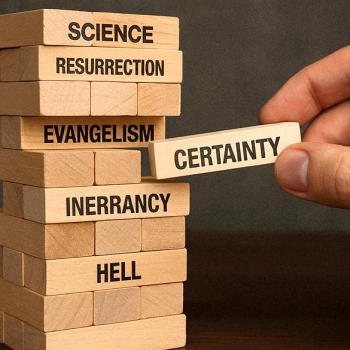Editor's Note: This is the second in a weekly series of Advent Meditations on the theme of "waiting" by blogger David Henson. Read his first meditation here.
Second Sunday of Advent
Isaiah 40:1-11, II Peter 3:8-15a, Mark 1:1-8
"First of all you must understand this, that in the last days scoffers will come, scoffing and indulging in their own lusts saying, 'Where is the promise of his coming? For ever since our ancestors died, all things continue as they were from the beginning of creation ... The Lord is not slow about his promise, as some think of slowness, but is patient with you, not wanting any to perish, but all to come to repentance!"
*****
O come, O come, Emmanuel
But God is late.
And ransom captive Israel
But where is this promise of the Lord's coming, of God with us, Emmanuel, again, for things have continued as they were from the beginning of the world?
That mourns in lonely exile here
But here wolves still tear lambs limb from limb. Captives remain caged. Ploughshares are wielded as swords, and the poor get poorer, hungrier. The wages of sin stalk the world with renewed vigor and devilish creativity. And the good news, too often, drowns in a roiling sea of sorrow and rage.
Until the Son of God appear.
But we are to wait. And we continue to wait.
Rejoice! Rejoice! Emmanuel shall come to thee, O Israel.
But when? The expectation of God's imminent return, of God's ultimate deliverance, ripples through these texts of Advent. Set against the backdrop of socioeconomic turmoil, Jewish rebellion, Roman suppression, and the eventual destruction of the Temple, it is easy to understand this apocalyptic mindset. In the context of presumed end-times upheaval, it is easy to ask followers to wait on the Lord if the relief of apocalypse is a mere generation away, as Jesus promised in last week's texts. It is easier to see the blood of martyrs water the earth and the smoke from a burning Temple choke out the sky when retribution and redemption will follow in just a few years.
It is easy to wait with an end in sight. It is much harder to endure the command to wait some 2,000 years later.
The end that had been promised by Jesus and elsewhere in the Christian sacred texts never came as expected. The return of Jesus has been delayed—maybe indefinitely, or at least that's how it seemed. Perhaps a union of angels had threatened to strike over some heavenly grievance. It's not hard to imagine that, say, there were too many damn rooms to clean in the Father's house and God's time clock, where a thousand days were like an hour, never paid a living wage. Perhaps Jesus—Emmanuel, God with us—got distracted, lost interest, or just plain forgot what with all the bells, whistles and wings twinkling and fluttering around him as the Resurrected Lord. Perhaps that chair at the right hand of God reclined a bit too much, was a bit too warm and cozy beside the fiery warmth of God.
Whatever the case, he's late. And, yet, we are still to wait, despite the deep temptation this Advent season to simply open ourselves up to the pain of a hard truth: he's not coming back as we have expected him to.
And, for that, we should be thankful, because the way in which Christians for centuries have expected the return of God isn't exactly the good news we might expect from the Son of Man who came to heal the sick, preach good news to the poor and usher in the peaceful, reconciling Reign of God. The author of second Peter reminds his readers that, in the end, instead of persecuted Christians being burned up as they were then, it would be the nonbelievers, and, indeed, the entire world that would be dissolved in flames. In fact, the world, as it is now, is being stored up specifically for fire.
In other words, it turns out that our current terrestrial, island home has been made, in the end, to be obliterated. When Christ returns, the author of the epistle informs us, Emmanuel won't come bearing a cross, offering to wash feet or restoring sight to blind. He will instead bring a blazing torch and the heavens and earth, and the sinners within, will burn in white-hot retaliatory rage.
In that case, then, don't come back at all. If the epistle's author is indeed correct in his eschatological vision, then, forgive me for saying so, God, but I'd rather you, regardless of your immanence here, simply keep your distance.
In that case, the cruelty of humanity might just be a mercy compared the judgment of God. Or at least there's very little discernible difference between a God who wants to watch the world burn and a species all too ready to light the match. Indeed, perhaps we are made in the image of our Creator.




